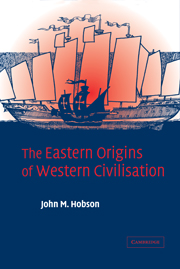Book contents
- Frontmatter
- Contents
- List of tables
- Preface and acknowledgements
- Map: Hobo-Dyer projection of the world
- 1 Countering the Eurocentric myth of the pristine West: discovering the oriental West
- I The East as an early developer: the East discovers and leads the world through oriental globalisation, 500–1800
- 2 Islamic and African pioneers: building the Bridge of the World and the global economy in the Afro-Asian age of discovery, 500–1500
- 3 Chinese pioneers: the first industrial miracle and the myth of Chinese isolationism, c. 1000–1800
- 4 The East remains dominant: the twin myths of oriental despotism and isolationism in India, South-east Asia and Japan, 1400–1800
- II The West was last: oriental globalisation and the invention of Christendom, 500–1498
- III The West as a late developer and the advantages of backwardness: oriental globalisation and the reconstruction of Western Europe as the advanced West, 1492–1850
- IV Conclusion: the oriental West versus the Eurocentric myth of the West
- Notes
- Index
3 - Chinese pioneers: the first industrial miracle and the myth of Chinese isolationism, c. 1000–1800
Published online by Cambridge University Press: 22 September 2009
- Frontmatter
- Contents
- List of tables
- Preface and acknowledgements
- Map: Hobo-Dyer projection of the world
- 1 Countering the Eurocentric myth of the pristine West: discovering the oriental West
- I The East as an early developer: the East discovers and leads the world through oriental globalisation, 500–1800
- 2 Islamic and African pioneers: building the Bridge of the World and the global economy in the Afro-Asian age of discovery, 500–1500
- 3 Chinese pioneers: the first industrial miracle and the myth of Chinese isolationism, c. 1000–1800
- 4 The East remains dominant: the twin myths of oriental despotism and isolationism in India, South-east Asia and Japan, 1400–1800
- II The West was last: oriental globalisation and the invention of Christendom, 500–1498
- III The West as a late developer and the advantages of backwardness: oriental globalisation and the reconstruction of Western Europe as the advanced West, 1492–1850
- IV Conclusion: the oriental West versus the Eurocentric myth of the West
- Notes
- Index
Summary
When Marco Polo traveled to the East and reported what he had seen, mixing truth with falsehood but in any event telling something of the truth, the men of the West refused to believe him. In the late Medieval Ages his account of his travels was viewed as a book of fables … It was as if occidentals were unable to believe in the reality of the marvels of the Orient.
Jacques Le GoffEuropean … historians [have not] yet realized that the rise of Medieval European civilization after ad 1000 coincided with an eastward shift of the world system's [productive] center from the Middle East to China. That is not surprising given the past pre-occupation of our medievalists with the national histories of England and France – implicitly retrospecting upon the entire human past the circumstances of the late nineteenth century, when the French and British empires did cover most of the globe. It requires a real leap of imagination to recognize China's primacy.
William H. McNeillBy 1100 the leading edge of global intensive power had shifted across to China and remained there until the nineteenth century. China also developed considerable extensive power and came to dominate in this respect after the fifteenth century (even though the Islamic Middle East continued to constitute a vital node of the global economy). All this stands opposed to the Eurocentric depiction. My critique of the standard Eurocentric characterisation of China is made in two stages.
- Type
- Chapter
- Information
- The Eastern Origins of Western Civilisation , pp. 50 - 73Publisher: Cambridge University PressPrint publication year: 2004



